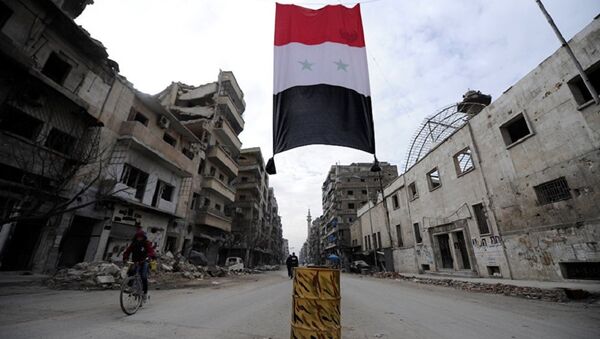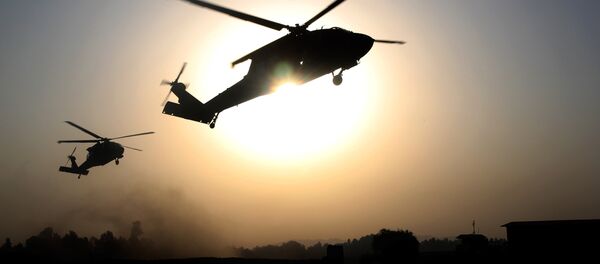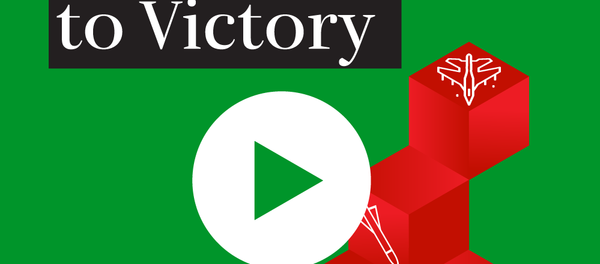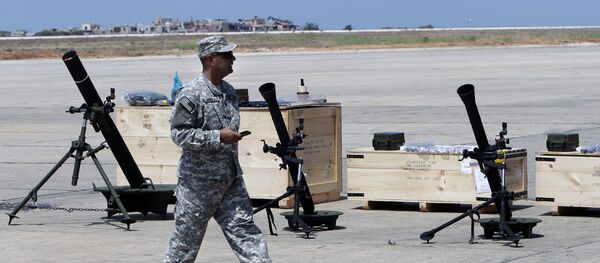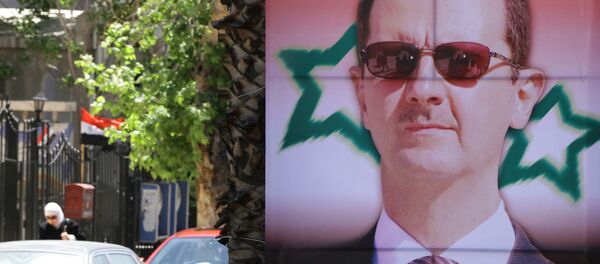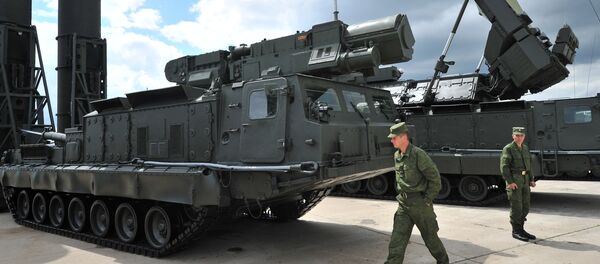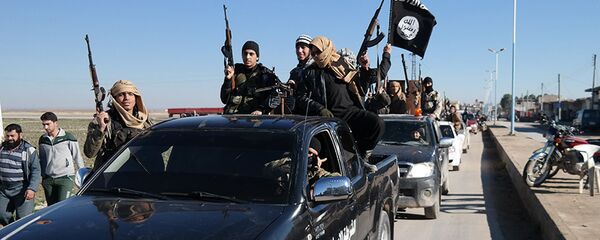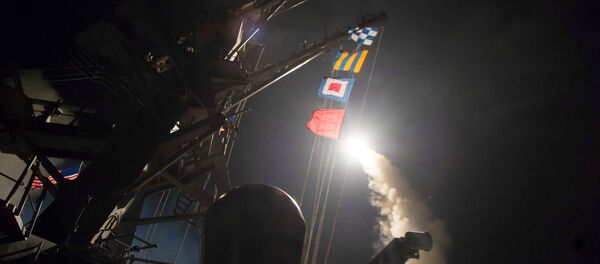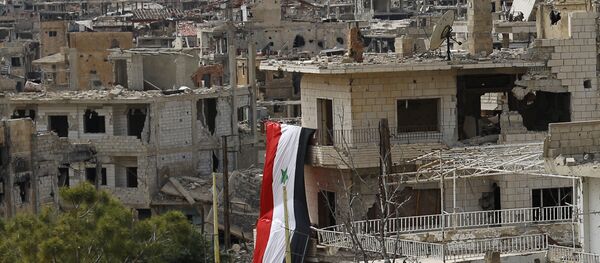From ISSG to Russia-Iran-Turkey Troika
The year 2017 began with the establishment of a new negotiations platform in the Kazakh capital, Astana, led by three states – Russia, Turkey, and Iran.
READ MORE: Syrian Opposition to Present Lists of Prisoners — Head of Delegation
Previously, it was the International Syria Support Group (ISSG), chaired by Russia and the United States, who took the first steps in the Syrian settlement process. However, the US administration changed in early 2017, and the new president did not show any clear intention to be particularly involved in the Syrian issue. The three states which have a strong interest in and influence on Syria – Russia, Turkey, and Iran – decided to use this window of opportunity by taking the settlement process into their own hands.
The troika started to call themselves guarantors of the ceasefire in Syria that was announced on December 29.
READ MORE: Member of House of Lords Baroness Cox: Russia Has Done Right Thing in Syria
From January until December 2017, the Astana platform held eight international meetings on Syria. Deputy foreign ministers from Turkey and Iran, the Russian special presidential envoy for Syria, delegations of the Syrian government, and armed opposition, as well as the UN team took part each time. The meetings were fast – two-three days maximum – and efficient. For the first time in recent years, Syria talks engaged armed opposition commanders from the ground and yielded concrete results on the cessation of hostilities.
The Astana format was meant to solve only military issues related to the peace process, and in eight meetings, it indeed managed to do so.
From Declaring Ceasefire to Having Functioning De-Escalation Zones
At the very end of 2016, on December 29, the Russian president announced that the Syrian government and armed opposition groups had reached an agreement on a nationwide ceasefire in Syria and on their readiness to start peace talks.
The next day, the UN Security Council unanimously adopted a resolution on a ceasefire regime in Syria, proposed by Russia and Turkey. The UNSC resolution 2336 also gave its consent to the launch of the Astana talks in order to facilitate the peace process and support the UN-mediated talks in Geneva.
It took Astana four meetings to arrive at such a monitoring System. In May, during Astana-4, the three guarantors discussed in detail the possibility of creating four zones of de-escalation in the country and establishing special monitoring mechanisms for each of them.
The proposed areas were: the northwestern province of Idlib and parts of neighboring Latakia province, Hama and Aleppo provinces; the north of the central province of Homs; eastern Ghouta near Damascus; and certain parts in the country's southern provinces of Deraa and Quneitra.
READ MORE: Tillerson Says US Needs to Work With Russia on Syria But Assad Must Go
Guarantors failed to agree on all of them at the same time, so since May, one after another, the zones were declared separately. The last remaining – in Idlib province – was the most problematic one because of the strong presence of Jabhat Fatah al-Sham (terrorist group banned in Russia) there.
It was not until the September Astana-6 meeting, that the guarantors finalized the agreement on all the four zones, for an initial six-month period, with a possibility for extension, which will probably become an issue in March 2018.
Obviously, the presence of the Iranian and Turkish troops in Idlib has been bitterly criticized – the opposition cannot stand Iranian involvement, while Damascus calls the Turks aggressors and occupiers.
Although the maintenance of the Idlib de-escalation zone is questionable, in general the military situation in the country has stabilized significantly.
“We [guarantor states] have managed to note a progressive development of the situation, a reduction in the level of violence, an observance of the ceasefire regime. I should say that quite intense fighting continues in certain areas, but this is mostly provocative in nature and mainly initiated by the so-called implacable armed opposition," Russian Special Presidential Envoy for Syria Alexander Lavrentyev told Sputnik after the latest, Christmas talks in Astana.
From Drafting Constitution to Preparing Syrian-led Body
Astana was meant to focus on military issues only, leaving the rest – namely, political problems – to the intra-Syrian negotiations in Geneva, mediated by UN Special Envoy for Syria Staffan de Mistura. Mostly, this arrangement held. Nevertheless, Astana meetings still managed to steal some of de Mistura’s thunder.
READ MORE: Russian Envoy Lavrentyev: Syrian Talks Boat Will Move Only if Rowed in Unison
Thus, during Astana-1 in January, Russia submitted to the Syrians who were present there a detailed draft of a new Syrian constitution. Although military groups refused to review it, insisting there should be a ceasefire first, constitutional proposals were conceived.
The draft prepared by the Russian experts suggested, among other things, the removal of the word "Arab" from the official name of the country, the expansion of the parliament's powers, the removal of the army from political life, giving equal rights to the Kurdish language with the Arabic one in the Kurdish "cultural self-ruling systems," as well as the taking away of the president’s right to dissolve the parliament.
The draft was later sent to de Mistura as well.
De Mistura, in turn, took up the mantle and ensured the future constitution and elections were prioritized on the agenda of his talks, composed of the so-called four baskets of issues: governance, constitutional process, elections, and countering terrorism.
The Geneva negotiations failed to work out any constitution proposals. The only achievement, in essence, was a so-called “paper of commonalities” compiled of common positions between the Syrian sides and describing the general parameters of the future Syrian state. The “non-paper” of 12 points was drafted by de Mistura in early 2017 and underwent changes in subsequent rounds of Geneva talks until the year’s end. The UN special envoy said that once it is finalized, it may serve as a basis for the future country’s constitution.
READ MORE: US-Led Coalition Estimated 1,000 Daesh Terrorists Remaining in Syria
Another track that the constitutional review process has been developing on comes from the so-called Astana opposition platform, led by Randa Kassis. She does not participate herself in either the Geneva, or in the Astana talks, but is actively participating in the defining of Syria’s future and has big plans as to her place in it.
In March, Kassis established the “Seminar on the Future Syrian Constitution” in Geneva out of Syrian experts, who held several sessions and worked out a list of recommendations, which were presented to de Mistura and Russia’s Deputy Foreign Minister Gennady Gatilov.
The Seminar, however, went dead soon after it was initiated, and after Moscow announced there would be a Congress of National Dialogue of Syrians in Sochi devoted specifically to constitution and elections issues, Kassis formed another group of experts (with just two French public law specialists) in October and started drafting with a clean slate. They have met several times since October and are going to have the draft ready by mid-January, just in time for the Congress.
READ MORE: Russian General Staff Calls US Explanations on At-Tanf Base 'Unintelligible'
Reports on the possibility of a massive conference of Syrians – the Congress – that would bring together various political forces emerged earlier in October in Arab-language media. Russian President Vladimir Putin also mentioned in his speech at the Valdai International Discussions Club that this idea existed and that a congress of the various Syrian opposition and government forces, as well as all ethnic and religious groups, could constitute the next step in the political settlement.
Various locations were cited as possible venues, Hmeymim was mostly mentioned. However, no details emerged until the Astana-7 meeting in early November, when guarantors discussed it preliminarily and announced that it would be called the Congress of National Dialogue and would be held in Sochi.
The event was initially slated for mid-November but has been postponed since then. The latest update on the date is January 29 and 30, 2018.
Moscow wants to see the establishment of a specific body for constitutional review in Sochi – a commission or a committee – composed of Syrians. A piece of de Mistura’s pie was stolen for the second time in January 2017.
READ MORE: Russia General Staff Chief Explains Who Trained Daesh Leaders in Syria
Moscow has been trying hard to ensure the participation of the UN special envoy for Syria in the Sochi Congress in a capacity of a mediator or at least as an observer so that the event does not look like it is contradicting the Geneva peace process, which has the mandate from the SC resolution 2254. Russian foreign and defense ministers even held a joint meeting with de Mistura on the eve of the latest Astana talks in December. Nevertheless, neither de Mistura himself nor anyone from his team has ever given any indication of their desire to attend the conference.
They are likely to keep it secret until the very last moment and, moreover, are planning to hold one more round of Geneva talks in the second half of January, just before the Congress, in order to have one more last attempt at forming a constitutional commission in Geneva before it is done in Sochi.
Geneva Talks: Ffrom Slowly Moving Train to Shuttle Diplomacy
UN-led intra-Syrian talks in Geneva have indeed seen no breakthroughs in 2017. Staffan de Mistura has recognized it himself.
The major problem has been an unwillingness on the side of the central government to engage in any dialogue with the opposition as such, and on the side of the opposition to soften their relentless stance on the need for President Bashar Assad to step down.
The Geneva talks in February started after almost a year-long break since the previous round, when the opposition side just walked out of the talks.
As a result of UN diplomatic efforts, the agenda was formulated as four baskets: governance, constitutional process, elections, and countering terrorism. The last round of Geneva talks in 2017 (in December) tried to focus on the constitution and elections only.
When the baskets were set, de Mistura said that “the train” of the Syrian settlement “started slowly to move.”
As for the format, it also saw steady progress. Geneva-7 in July crystallized the two-level work style: general or political level and technical or expert level. The UN experts started meeting separately with the Syrian government team and with representatives from all the opposition platforms together in order to discuss the new Syrian constitution.
READ MORE: Syrian Party Says Armed Groups to Skip Sochi Congress Fearing Loss of Backers
The format of the talks saw progress even later on. By the year’s end, a slowly moving train of Syrian peace talks turned into a speedily circulating shuttle. In November, de Mistura introduced a “shuttle diplomacy practice,” as he put it himself. Delegations of the Syrian opposition and government both arrived at the UN Palais for meetings with the special envoy and stayed in different rooms at a distance of five meters from each other, while de Mistura was moving between them.
Syrian Opposition: From Scattered Groups to Single Delegation
But the main achievement of the Geneva process in 2017 came from the opposition side.
By the time of Geneva-8 in November-December, scattered opposition factions, which had previously even refused to recognize each other’s right to exist, managed to do what the UN, the international community and even the Syrian government had been always asking them to do – they formed a single delegation for the talks.
However, on November 22-24, various groups of the Syrian opposition held an extensive meeting in Saudi Arabia's capital Riyadh, the so-called Riyadh-2 conference, and elected a group of 22 negotiators from among all of them. It comprised representatives of the National Coalition for Syrian Revolutionary and Opposition Forces, which was a basis for the High Negotiations Committee at the previous rounds of talks; the armed opposition's Free Syrian Army Southern Front; the Moscow and Cairo platforms, as well as independents.
READ MORE: Syrian Army's Warplane Downed by Militants Near Hama, Pilot Killed — Reports
They also managed to come out with a single voice regarding their negotiation position – they adopted a joint Riyadh-2 communique.
Hopes were high for the start of direct negotiations at Geneva-8, as an absence of a single opposition delegation had been the major stumbling block previously.
However, the Damascus team refused to engage anyway. Delegation head Bashar Jaafari insisted that direct talks are impossible until the Riyadh-2 communique is changed, and the provision that Bashar Assad must go at a very early stage of a transitional period removed.
World Leaders: From Calls for Regime Change to Focus on Fight Against Terrorism
Although the opposition delegation refused to soften stance its and remove the requirement of Assad’s departure from their program statement, some countries have been less adamant.
READ MORE: Erdogan's Claims That Assad is a 'Terrorist' Have No Legal Basis — Moscow
France and the United States have gradually drifted away from the “regime change” strategy on Syria and started prioritizing the fight against terrorism instead. Even Saudi Arabia apparently has softened its views.
In the same month, US media reported, citing sources in the president's administration and Congress, that the new US strategy in Syria would not include the departure of incumbent President Bashar Assad as a precondition and would allow for closer military cooperation with Russia.
“More and more countries that previously took a hard line with regard to the current authorities in Damascus are revising their position. For example, Saudi Arabia. When I attended, on the president's instructions, the Conference in Riyadh, the so-called Riyadh-2, they were absolutely emphatic in trying to make the opposition change its mind and to persuade them to remove the insulting passages with regard to the incumbent authorities from the final communique,” Russian special presidential envoy for Syria Alexander Lavrentyev told Sputnik in an interview at the end of the year.
Political Settlement Process: From Astana to Sochi
The year is coming to its end with all stakeholders in the process of the Syrian settlement counting on the Sochi Congress in early 2018.
The Congress is expected to bring together some 1,500 people – Syrians from inside and outside Syria, internal and external opposition, central authorities, clergy, and religious and ethnic groups. They will all have a floor to speak out and describe how they see the future of their country. Only Syrians themselves will have the floor. Other countries and organizations, if any, will only be observing, without exerting any pressure on the participants.
READ MORE: Was Yemen the Most Important Story of 2017 and Why Was it Under-Reported?
The work will be organized in subcommittees – on constitutional reform, on humanitarian issues, on issues related to the reconstruction of Syria, and possibly some others. The Congress will also appeal to the international community asking it to raise funds for the reconstruction of Syria.
Moscow keeps insisting that the Congress would only give an impetus to the Geneva peace process.
“It should indeed become a milestone in promoting a political settlement. The date has already been set, it is 29th and 30th (of January 2018 – ed.), everybody here has essentially agreed, everybody understands that there can be no more delay, that we cannot put all this off again and again, especially since it should contribute to the Geneva negotiations,” Lavrentyev said.
However, it strongly resembles what was said in the beginning of the year about the first Astana meeting:
"We expect that the meeting on the Syrian settlement planned for this date [January 23, 2017] will become a new milestone on the road to peace in troubled Syria, and give a significant impetus for all Syrian parties on renewed intra-Syrian talks on February 8 in Geneva," Foreign Ministry spokeswoman Maria Zakharova said.
The special presidential envoy did not exclude that the process that is to be launched in Sochi would progressively move to other capitals afterwards.
Apparently, we are witnessing the inception of one more negotiation track parallel to Geneva.

